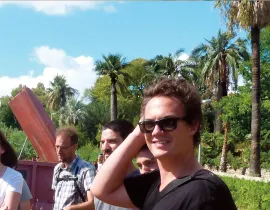Discover the world of vine ecology and physiology, essential for mastering the art and science of winemaking. Explore how climate, soil, and viticultural practices intertwine to shape grape growth and wine quality. From understanding grapevine physiology to managing climate challenges, this course equips wine industry professionals with the knowledge to cultivate exceptional wines sustainably."
- Period ?
-
- From : 03/10/2025
- To : 04/04/2025
- For who ?
-
- student with a French diploma
- international student
- employee or job seeker
- Anyone in the vine and wine industry and meets the pre-requisites.
- Where ?
-
- L'Institut Agro Montpellier - La Gaillarde Campus
Aims
Vine Physiology
- Gain a fundamental understanding of grapevine physiology, including fruit growth and composition, and how these aspects respond to the interplay of genotype, abiotic environment, and crop management. This knowledge will enable effective vineyard and crop management practices such as pruning, canopy architecture, crop load management, and input application (water, nutrients) to meet specific yield and wine profile objectives.
- Learn to apply practical methods derived from research, including an introduction to remote sensing approaches and specific decision-making tools that identify physiological measures. This will aid in assessing fruit development, composition, and ripening, thereby improving cultural practices and harvest decisions.
Vine Ecology
- Understand the impacts of climate factors and soil characteristics, and their interaction with viticultural practices such as irrigation, soil preparation, cover crops, and nutrient supply to produce desired wine styles and yields.
- Gain the ability to assess and manage potential negative impacts of climate (drought, radiation, frost, hail, high wind) or soil conditions (acidity, pH, erosion, poor organic matter content, salinity).
- Learn to evaluate and measure climate and soil parameters to characterize existing or new sites/terroirs, adapt varieties and rootstocks to new locations, meet market demands for wine styles, and manage inputs like water and nutrients.
Theme
- vine and wine
-
Programme
Language of instruction : In English
Vine Physiology
Lectures
- Berry growth and biochemical processes
- Growth of vegetative parts
- Efficiency of light interception
- Modeling phenology for predicting environmental risks
- Water relations
- Remote sensing applications
- Communication between roots and shoots
- Acquisition of carbon and nutrients
Practices
- Sequential harvesting and its impact on wine flavor profiles
- Phenology modeling
- Modeling light interception
Vine Ecology
Lectures
- Climate factors affecting vine growth: temp, hail, rain, wind
- Climate change and grapevines. Observed and simulated impacts and adaptation strategies
- Climate indexes
- Water Balance (Terroir)
- Water Balance (model)
- Basics in Soil
- Soil Ecology
Practicals
- Visit to Domaine du Chapitre
- Climate indexes (practice)
Keywords; ViniferaOffer, Vine, Physiology, Ecology, Climate, Soil, Viticulture, Winemaking, Terroir, Remote sensing, Cultural practices
-
Prerequisites & registration
Knowledge of viticulture and winemaking (oenologists, sommeliers, winegrowers).
English: fluent
Staff team
Place
L'Institut Agro Montpellier
Campus de La Gaillarde
2 place Pierre Viala
34060 Montpellier - France
Fees
€513/week
Contacts
Website
L'Institut Agro Montpellier
2 place Pierre Viala
34060 Montpellier - France
Tél. : +33 (0)4 99 61 22 00 Tél. : +33 (0)4 99 61 22 00
Fax : +33 (0)4 99 61 29 00
contact@supagro.fr
















